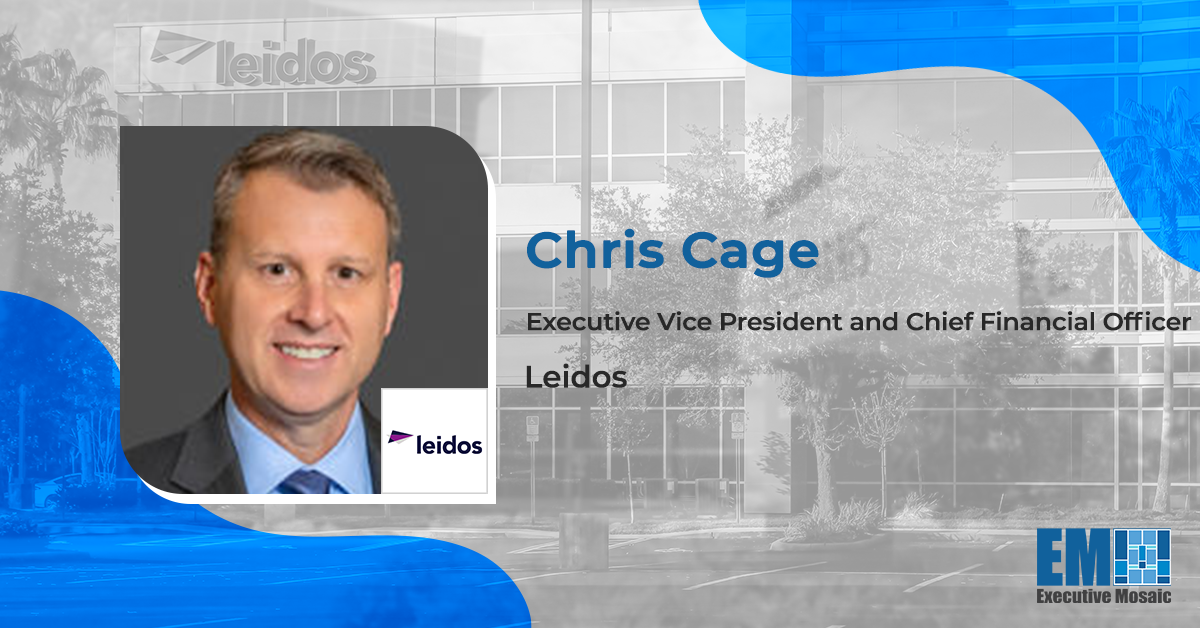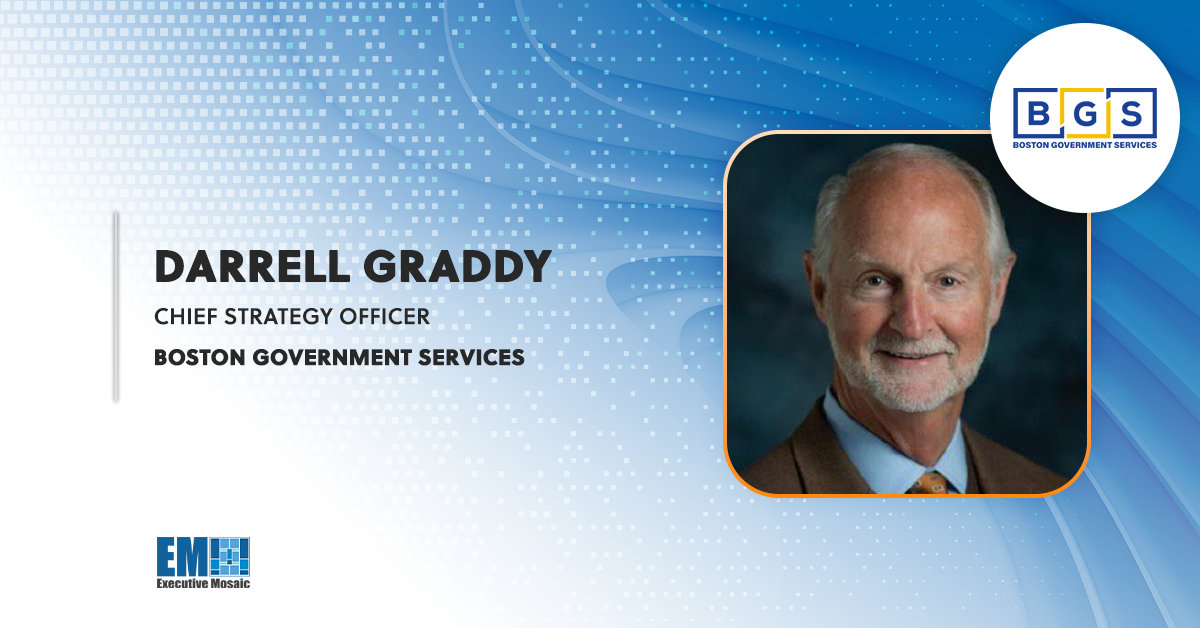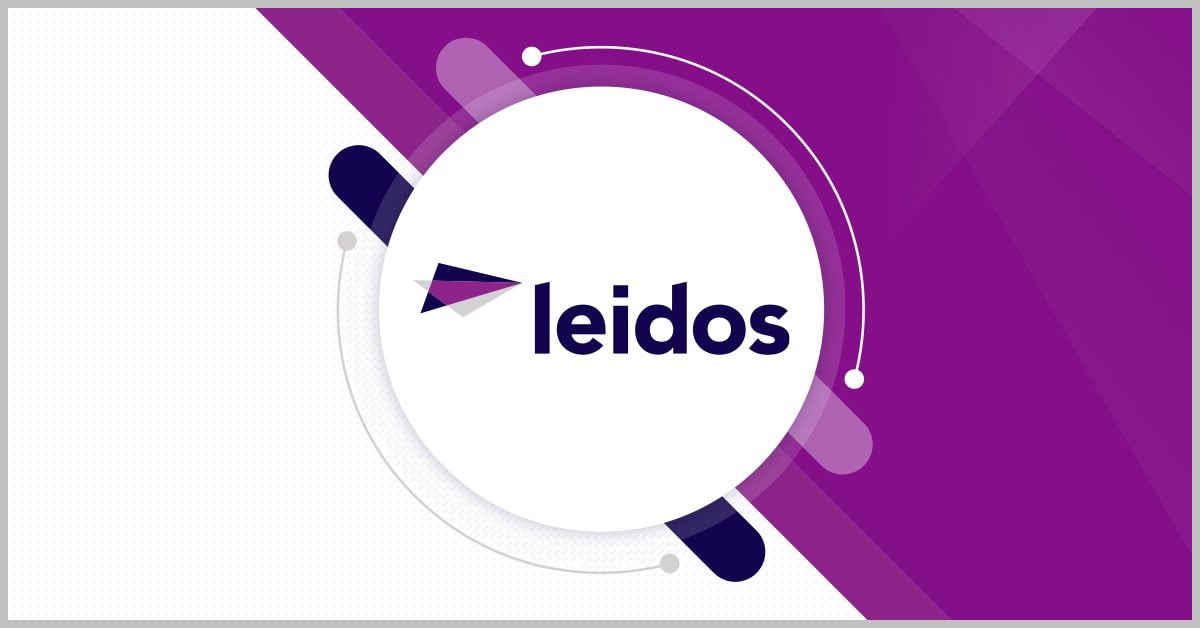The financial ecosystem of the government contracting landscape is constantly evolving and changing to address emerging mission needs, support new requirements and propel the nation forward in today’s era of global competition.
Having been in GovCon finance for over two decades, Chris Cage is both uniquely familiar with and well-positioned to lead his organization through these market fluctuations. Cage joined Leidos over 24 years ago, and for the past year and a half, he has overseen all financial activities of the company as executive vice president and chief financial officer.
GovCon Wire sat down with Cage to get his insights into the major GovCon trends moving the market, where Leidos’ M&A activity may be heading and why company culture is so integral to success in today’s competitive environment.
Read below for GovCon Wire’s full Executive Spotlight interview with Leidos CFO Chris Cage.
GovCon Wire: Chris, you’ve been Leidos’ top financial executive for a little over a year, but you’ve been with the company for over 24 years. How has the GovCon market changed during your time at Leidos, and what do you think is the most significant trend driving the market today?
Chris Cage: “I’ve been in the industry for some time now, almost 25 years. And of course, if you’ve been around this industry long enough, you see various cycles within the federal government and budgets. We’ve seen periods of expanding budgets and contracting budgets, we’ve seen overseas contingency operations and supplementals and we’ve seen lowest price technically acceptable.
We’ve also seen a lot of consolidation. Some of the larger primes have exited their services businesses. With these transactions, we’ve seen consolidation, we’ve seen scale mattering on the service side and we’ve seen the expansion into new market areas.
Some of the big tech companies have now made more of a fist around some of their digital modernization capabilities. Also, the engineering procurement construction firms have now entered the GovCon landscape. So it has evolved, but I think the fundamentals really remain the same.
To be successful, you need deep customer mission understanding, you need to enable enhanced mission outcomes. We’re doing that through applying technology, driving process improvements, increasing insights to our customers and helping them modernize.
As far as the trends that are impacting us today, I’d point to first and foremost, the great power competition. We’re seeing a change in what is important and relevant to our DOD and intelligence customers as they look ahead to the rest of this decade and what they need to be prepared for with near-peer and peer adversaries emerging. That translates into capabilities around things like Joint All-Domain Command and Control, space and airborne ISR with more standoff and more range.
Another trend that’s impacting everybody is what’s going on with the workforce. Coming out of COVID and the great resignation, we see how that has changed things. We’re all adapting to a talent gap in the marketplace. There’s more demand than supply, and maybe that’s normalizing a bit, but people have rethought how they want to spend their time, what options they have, where they want to work from and how much they want to work.
The industry is adapting — there’s more hybrid work taking place, we’re in more competition for talent. We’re thinking differently around how to enable more automation of certain processes. What does the talent pool really look like and where is it located? I think those are some important trends that we’re still navigating.”
GCW: Can you talk about Leidos’ growth strategy? How are the trends we just discussed informing or influencing this strategy?
Cage: “We’re organized into five groups in key customer market areas that cut across health, civilian agency, defense, intelligence, and then we have our Dynetics group focused on defense systems. One of the bigger trends that cuts across those organizations is digital modernization.
We’re managing some of the largest customer networks in the world, whether that’s the Department of Defense network, the Navy Marine Corps, or NASA. We’re focused on providing more security, more cloud-enabled application development, trusted AI/ML capabilities and more. In the digital modernization space, we’re making things more secure, more efficient and more connected.
Secondly, there’s a grouping of capability areas that we call mission systems integration. These are often physical products that are digitally enabled and that are bringing together the physical and digital worlds in areas like space payloads, security screening equipment, hypersonics, maritime autonomy and airborne ISR.
Especially in the great power competition that I talked about, a lot of those capability areas are critically important because we’re looking to advance capabilities, to have more forward presence, more visibility, more standoff and more range. We’re excited about those areas where we can really bring together the best of Leidos’ technical innovation and leverage our capabilities in cyber, software development and more.
One key differentiator for us is what we refer to as ‘speed, security and scale.’ We can get things done quickly for our customers, we can get things done securely and we have the scale to take on major programs of record. We can deliver more capability more affordably and with more relevance to the evolving threat landscape.”
GCW: Leidos’ Q3 FY22 financial results show a four percent increase in revenue for the quarter. What’s driving this growth?
Cage: “We’re very pleased with our third quarter results that we just released. You’re right, we saw a little over four percent growth, improving profitability and record cash flow. As we look ahead to the end of the year, we see that strength on the growth side continuing across a number of different areas for Leidos. I mentioned earlier the Navy Marine Corps network — we won a big program, the Navy NextGen program, which has been increasing in volume over the course of the past 12 to 15 months, so that has been a growth catalyst for us.
Additionally, in the digital modernization area, we took over a NASA network contract that has been expanding, so we’re seeing a lot of growth there. We also won a program called Defense Enclave Services for DISA, and we’re really excited about that. It’s not a growth catalyst today, but it will be for us in the future. So we have some great things happening there.
We’re also seeing some expansion in our security products business around ports and border security with Customs and Border Protection. Then we have our force protection programs out of our Dynetics unit, a family of indirect fire protection programs, which have been nice growth catalysts for us. But we’re really seeing it across the portfolio, and that’s why we love having a diversified portfolio. In times like these where you’re seeing a lot of demand across a variety of customers, we’re benefiting from that.”
Cage: “Leidos has almost 10 percent of its revenues from international operations today. We have a large presence already today in Australia — it’s an important area for us and it’s a well-run business with a great leadership team in-country. Most of that work today has been focused more towards the digital modernization side.
The Cobham special mission business gave us an opportunity to expand into an area that we do domestically on airborne intelligence, surveillance and reconnaissance. We’ve had a long history of performing that type of work for DOD customers. We know the mission, we have the capability, we have flight safety officers, we have mission management capability. When an opportunity like this came around, we just thought it was a natural fit.
And given my comments on the great power competition, combined with Australia’s proximity to China, we just think as you look ahead over the course of the next five to ten years, Australia is very interested in their maritime surveillance capability and their own security. So we just felt like this would be a growing market in an area where we see an opportunity to extend into other parts of the Australian government customer set.”
GCW: Can you tell me more about Leidos’ M&A plans or initiatives? Are there any new markets or capabilities you’re looking to add to Leidos’ portfolio?
Cage: “I’ll first start by saying this will be our sixth M&A deal in the past two and a half years. So we’ve been active, and we’ve certainly paid attention to what’s going on in the marketplace. We’ve been thoughtful around adding capabilities that are important for where our customers’ missions are evolving into the future.
When we talk about M&A, we first look at our strategy and we determine if there is something that could help us accelerate that, whether by bringing more technology to bear or accelerating technology development or giving us different customer access.
As we look ahead, I would say there are probably no glaring needs. We’re always paying attention to the market. We’ve got a great corporate development team led by Adam Sheipe. We’re looking at areas that complement what we do in cyber, artificial intelligence and machine learning, mission software — we’re paying attention to anything that lines up with our technical core competencies.
Space assets — although those have been very expensive — might be interesting to us. But we’ll be a disciplined buyer. Given the fact that we’ve been active, we’ll be selective as we move forward and look for what we can absorb, probably more small tuck-ins than anything of size. And it has to be priced fairly. It’s not always easy to find those things. But we’ll certainly be paying attention to the market and looking for opportunities.”
GCW: Company culture and strong values are especially important in today’s talent shortage. Tell me about Leidos’ culture. What aspects of the company do you think are contributing most to Leidos’ success and attracting (and retaining) top-level talent?
Cage: “Company culture is critically important, and honestly, this is one of the things that makes me most proud to work at Leidos. Our mission, vision and values are on the cover page of every presentation — it’s the way we start most meetings. We live them everyday.
Our six core values are integrity, inclusion, innovation, agility, collaboration and commitment. We take those things to heart. We’re going to do the right thing as we make decisions and act the right way as a company, whether that’s for our employees, for our customers or for our communities, we’re going to do it as a team. That is what helps us differentiate with our customers.
The tone at the top is really all about those core values and doing things the right way. As an employee, I think you’re going to see that, you’re going to feel that, and it’s going to be complimented by the way we treat people fairly — certainly as it relates to compensation and growth opportunities.
We are investing in our people. We want to see people have chances to grow their skill sets. We make a lot of additional training and skill enhancements available to people and we want to grow and develop them.
It’s not just coming to Leidos to have a job. Hopefully people can follow in my footsteps and have a really great career here. Having been here almost 25 years, I know that’s what we want and that’s available to people. I think it offers them a lot of diversity in what they can do and what they’re interested in because as I mentioned earlier, whether it’s international operations, commercial operations, government across multiple segments, it’s all available to you. Those are the things that attract and retain people — you can get into a great company that does things the right way and you can make a great career. I’m definitely a passionate fan of Leidos.”






